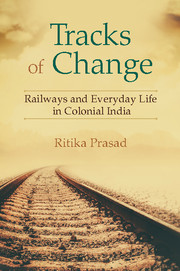Book contents
- Frontmatter
- Dedication
- Contents
- List of Tables and Figures
- Acknowledgements
- List of Abbreviations
- Introduction
- 1 The Nature of the Beast? An Elementary Logic for Third-Class Travel
- 2 Demand and Supply? Railway Space and Social Taxonomy
- 3 Crime and Punishment: In the Shadow of Railway Embankments
- 4 Railway Time: Speed, Synchronization, and ‘Time-Sense’
- 5 Contagion and Control: Managing Disease, Epidemics, and Mobility
- 6 Designing Rule: Power, Efficiency, and Anxiety
- 7 Marking Citizen from Denizen: Dissent, ‘Rogues,’ and Rupture
- Conclusion
- Bibliography
- Index
- About the Author
4 - Railway Time: Speed, Synchronization, and ‘Time-Sense’
Published online by Cambridge University Press: 05 September 2015
- Frontmatter
- Dedication
- Contents
- List of Tables and Figures
- Acknowledgements
- List of Abbreviations
- Introduction
- 1 The Nature of the Beast? An Elementary Logic for Third-Class Travel
- 2 Demand and Supply? Railway Space and Social Taxonomy
- 3 Crime and Punishment: In the Shadow of Railway Embankments
- 4 Railway Time: Speed, Synchronization, and ‘Time-Sense’
- 5 Contagion and Control: Managing Disease, Epidemics, and Mobility
- 6 Designing Rule: Power, Efficiency, and Anxiety
- 7 Marking Citizen from Denizen: Dissent, ‘Rogues,’ and Rupture
- Conclusion
- Bibliography
- Index
- About the Author
Summary
In 1919, a shopkeeper from Gujranwala was charged with ‘waging war against His Majesty.’ Under section 121 of the Indian Penal Code, a martial law tribunal accused Jagannath of fomenting agitation in meetings held on 12 and 13 April and of taking ‘a very active part’ in having shops closed on 14 April. The tribunal argued that these events were central in Gujranwala's decision to replicate the violence seen in Amritsar. Jagannath defended himself with an alibi, offering railway timetables as proof that he could not have committed the acts that he was being charged with. He explained that he had left Gujranwala for Kathiawar on 12 April by the 5.00 p.m. train. He also offered to produce witnesses to corroborate his presence in Dhoraji on 16 April—since it took 44 hours to reach Dhoraji from Delhi by the fastest train, so their testimony, combined with railway timetables, made it impossible for him to have been in Gujranwala after 6.00 p.m. on 13 April. The tribunal allowed him to summon witnesses who could prove this alibi but pronounced judgment without waiting for them.
‘Jagannath's Case’ became somewhat of an albatross around the imperial neck, with the legally trained nationalist leader M.K. Gandhi insisting that railway timetables ‘completely established’ his alibi. Its explicit political valence aside, Jagannath's use of railway timetables as legal defence suggests the extent to which railway infrastructure had permeated everyday life in colonial India. Important here is Jagannath's depiction as one among millions of ordinary Indians: ‘a man of humble position and status,’ a petty shopkeeper who was ‘unknown to fame and unconnected with any public activity.’ Jagannath's alibi did not protect him legally since the tribunal did not wait for him to produce witnesses. However, his story shows how technical artefacts linked with railways—train schedules, railway timetables, and station clocks—had become integrated into people's lives. These both embodied and fostered a changing temporal order, one that someone like Jagannath had absorbed effectively enough to deploy creatively in his defence.
Information
- Type
- Chapter
- Information
- Tracks of ChangeRailways and Everyday Life in Colonial India, pp. 134 - 164Publisher: Cambridge University PressPrint publication year: 2015
